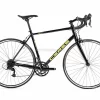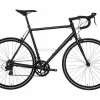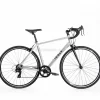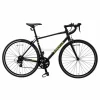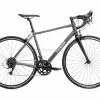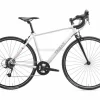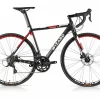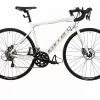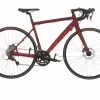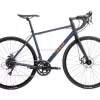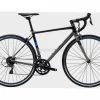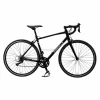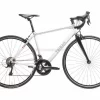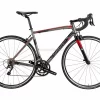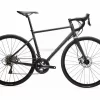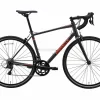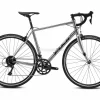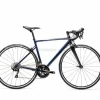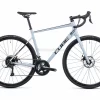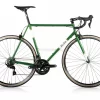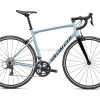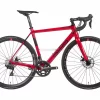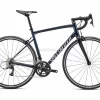Cheap Road Bikes
Ride the tarmac on a budget; save money on your new bike!
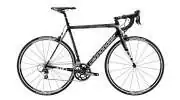
A Road Bike is designed solely for riding efficiently on tarmac, featuring a lightweight rigid frameset, 700c diameter wheels, drop handlebars and skinny tyres.
I search for cheap Road Bike deals, and post them here to save you money! Below you'll find my current road bike deals, from high end carbon road bikes, to entry level alloy models and everything inbetween.
Have you been watching le Tour De France, and fancy having a go at road cycling? Or an established roadie looking for your next bike? Either way there's no point in overspending on your new skinny wheeled steed.
My road bike section is updated daily, so keep checking back if you have a specific bike in mind - I can save you £1000's.
The bikes in this section are listed by cheapest first, so whether you're after carbon, alloy or steel, hopefully you'll find the perfect bike at a bargain price! Claire x
Interested in riding offroad too? Check out my Mountain Bike and Gravel Bikes sections instead!
Road Bikes Frequently Asked Questions
Click on a topic to view my answer.
- What's the best cheap road bike?
If you're on a budget, then you'll have a multitude of options for entry level road bikes. But which one is best? In my view, you should plump for the road bike which offers a combination of the best value for money overall, together with the best frameset for the money.
In terms of pure value, I would recommend either choosing last year's or an older model for two reasons:
- It will probably be discounted
- As component prices increase, older bikes tend to have higher specifications than their equivalently priced current model.
So you'll get a cheap bike with a relatively high specification.
You also have the option of going down the second hand route to save yet more money, although you won't receive a warranty if buying from a private seller.
I've already covered framesets on this page, but essentially choose a bike with the best possible (and most suitable) frame. Ensure it's the right material, correct size, provides the required braking type, as well as the other features such as mudguard and pannier mounts, that you require. Get the fundamentals right; Components can easily be upgraded later on, but the frame is the heart of the bike and will be costly to replace.
Prices fluctuate, bikes ranges are replaced (and money off vouchers / Cashback policies constantly change) so I can't recommend a specific model, but I have been impressed with the shop own brands. Less "middle men" and distributors and increased buying power equals high value for their customers.
In terms of manufacturers, I would personally look at the own brand bike ranges from Merlin Cycles and Go Outdoors, as well as the sale sections from all the major online retailers - these will offer the best value for money.
Finally, if you're in the UK then take a look at the Ride to Work scheme - this can save you yet more money.
- What's the best road bike for beginners?
If you're a beginner cyclist, I'd advise looking at bikes with slightly wider bars and tyres to provide that extra control; skinny wheels and narrow bars can be tricky to get used to.
One important factor for beginners to bear in mind is your future riding plans. If you know you're definitely going to stick to the tarmac, then a road bike is a safe bet.
However, if you're only going to be travelling short distances, and aren't that experienced, then a flat handlebar rigid commuter bike may be more suitable.
Similarly if you plan on tackling a few bridleways and bumpy canal paths, then a gravel bike will be the best option.
Essentially, make sure you choose the right tool for the job; if you buy the wrong bike, then it won't be as fun to ride.
Ideally, I'd also recommend borrowing a bike if possible, to learn more about what both suits and fits you.
With regard to which bike to choose - I've provided information on this under the "What's the best cheap road bike?" tab.
Don't spend an absolute fortune, as initially what will restrict you will be your fitness, skill and confidence levels; buying a £10K bike won't make you ride like a pro. Once you've caught the cycling bug, and have learnt more about what suits you then you can upgrade a few months down the line.
- Is it cheaper to build or buy a road bike?
Generally speaking it's cheaper to buy, as bike manufacturers have enormous purchasing power, and so can build bikes at a significantly lower cost than you.
The exception to this is if you have access to cheap second hand parts (or a large spares bin).
If building, you also have to factor in the tools required to build the bike. In time, tools will pay for themselves, but this initial cost will further increase your build price.
Very occasionally, at the higher end of the market, you may be lucky enough to find massive savings on a frameset, wheels and groupset which result in building being the best option. However, this is virtually impossible for sub £500 bikes.
It can be cheaper to buy a complete second hand bike that's approximately right for you, and then replacing the odd part.
However generally speaking, unless you're prepared to spend hours hunting down cheap components and waiting for sales, then buying a complete bike will work out cheaper.
- How do I build a cheap road bike?
I've partially covered this in the question above; essentially it's a case of both the hard work of tracking down deals, and the patience of waiting for sales.
Arguably the cheapest way of building your own bike would be buying either a complete, or partially built second hand bike, and then replacing the required components. You can then sell any unwanted parts to recoup more money.
If deciding to go down the new route, hunt down a cheap budget frameset, then find a sale wheelset to match, and slowly make your way through the components required.
Plan your purchases well, as delivery charges can add up; buying multiple items from the same retailer can result in free shipping, as well as qualifying purchases for money off if they exceed certain totals.
Combining purchases will also save you money; groupsets are usually far cheaper to purchase as one item, than buying each item separately.
Please ensure all the parts you buy are both compatible and suitable for the riding you wish to do.
If your budget is low (sub £500) and you're buying new, then you will struggle to build a cheaper bike than what can be bought off the shelf, but you will end up with a ride that is customised for you.
Finally, take advantage of cashback websites where appropriate.
- How can I make my bike cheaper to run?
Essentially this is a case of downgrading some of your consumable parts, without sacrificing performance.
Consumable parts are components such as chains, cassettes, chain rings, brake pads, tyres and tubes - items which wear out over time and need replacing.
Personally I run 8 speed on some of my bikes, as it is very reliable, easier to setup, requires less maintenance and very cheap to replace. A new 8 speed chain costs approximately £8 and cassette would be £15, which is far less than the higher geared alternatives.
Buying these items in bulk when they are on sale is the easiest way to make cycling cheaper. Stock up on tyres and tubes when they're half price; you might not need them now, but you will in a few months.
This method also has the advantage of never being stuck without a usable bike, as in time you'll have a box of spares ready to go.
Quick guide to buying a cheap yet suitable road bike
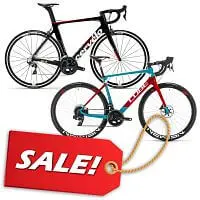
How to save money on your dream bike
Whether you're an experienced roadie looking for that dream stealthy carbon machine, or an occasional rider after a winter training bike to keep fit on, purchasing a road bike online can be tricky. For the most part you can save money online when compared to buying at smaller independent bike shops, but there are several trade-offs.
- Firstly you aren't supporting a local business, which can be a deal breaker for many.
- Secondly, you won't be able to research as much about the bike's sizing, handling and whether it is actually any good, than if you were stood in your local shop with the road bike physically in front of you.
- Thirdly, many local bike shops offer discounts for regular customers, so whilst the bike may initially seem a lot more expensive, the reality may be different. In short, online is not the route for everyone, but if you have chosen to tread this path, then below are a few quick tips.
So how do I find a Discounted road bike?
Firstly you need to decide whether you are buying a new or second hand bike.
Getting a cheap new bike
If buying new, you will benefit from a warranty, as well as being safe in the knowledge that the bike is working well and not damaged at all. Locating the bike you want at the cheapest price can be tricky - however, bookmarking this page is a good start - all of the road bikes listed here are searchable by size and the list is regularly updated. Last year's models tend to be heavily discounted and due to rising costs in manufacturing often have a superior specification to this year's equivalent road bike. You'll still have several factors to decide, such as frame material, brake types, which I've covered further down the page - please don't just buy a road bike as it's very cheap; it has to be suitable too!
Saving money on a second hand road bike
Going down the second hand route has it's advantages - typically you'll save more money as the seller's circumstances often result in bikes being priced to sell. The downside is that they will be "sold as seen" and so unless you feel you are a reasonably experienced cyclist then it might be difficult to ensure that the bike has no major issues, as you won't have a warranty to fall back on. Gumtree, Facebook Groups & Marketplace, and eBay are the most popular websites for cheap used bikes.
Road Bike Sizing
I have written an extensive article on road bike sizing here. Or you can skip the in-depth stuff and read on here; If you're an experienced rider, then chances are you'll know what sizing and geometry works for you. However for newbies this can be daunting, so if possible try and borrow a road bike from a friend. Please note that your mountain bike sizing will be smaller than your road cycling equivalent, as you won't need as much standover height when cycling on the road. If you ride comfortably off road on a 17 inch MTB, then chances are you'll need a larger road bike frame, as you won't need to negotiate drop offs, jumps and berms whilst tackling the tarmac (if you do fancy riding a bit of off-road, please refer to my Gravel Bikes). If borrowing a bike is impossible, then some local shops will offer a paid professional measuring service (although please be honest from the start that you will not be subsequently purchasing a new bike to avoid upsetting any shop owners). Failing this, there are guides online to establish your approximate sizing; Sizing can differ slightly between manufacturers, so it's worth researching this area further before buying.
So what should type of frame should I have?
Bike Frame Material
Regarding frame material, this is down to personal preference. 95% of the road bikes on the market will be either alloy or carbon, with a few steel and titanium models thrown in. Niche brands even produce bikes out of magnesium and bamboo, although I won't cover those here simply as they are fairly scarce. Each of these core materials have different properties and subsequent advantages:
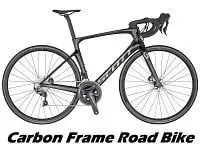
Classy Carbon Fibre Frames
Carbon is lightweight, stiff and fast, but also expensive and not too crash resistant. Metal frames will dent from heavy blows, whereas carbon is more brittle and may well break. Essentially carbon frames excel at their chosen purpose (being stiff, fast, lightweight and strong) but struggle to deal with unnatural forces, such as those generated by crashes. Typically carbon frames are found on road bikes costing over £1000, although carbon forks frequently feature on cheaper bikes around the £500 mark.
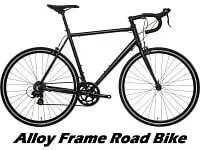
Awesome Aluminium (alloy) Road Frames
Alloy (aluminium) is slightly heavier, but cheaper than carbon; it isn't as strong as steel, but offers a better strength to weight ratio thus resulting in a lighter frame. It's far easier to repair than carbon, and the vast majority of manufacturers will produce a range of alloy framed road bikes, making it more popular than steel. The majority of cheap road bikes feature an alloy frame, as it's less expensive to manufacture than carbon. In the past grand tours were regularly won on alloy framed bikes, but advances in technology mean that, for the most part, this material is reserved for road bikes costing under £1000. To summarise, alloy framed bikes are stiff, cost effective and pretty lightweight, yet not as fast as carbon.
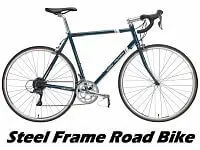
Keep it real with Steel!
Steel is real, as old time riders will tell you; a traditional material, which although slightly heavier still, is incredibly strong even in the event of a crash. Furthermore it is relatively easy to repair, resulting in a lengthy lifespan. Often used for training and winter bikes, steel is still a popular choice amongst British riders, although not as prevalent as carbon or alloy. As mentioned, there will be a weight penalty when choosing steel, however the increased durability may swing it for you. It also has a more forgiving ride than a stiff carbon or aluminium frame, so is popular with long distance riders.
In short, in terms of weight and racing performance the order goes Carbon > Aluminium > Steel, with this order reversed in terms of both crash resistance and ease of repairs.
Whatever bike frame material you decide is best for you, please ensure than it is suitable for your riding. If you need to fit panniers and mudguards, then establish that this is possible, as it's very difficult (and/or somewhat expensive) to change this at a later date.
Braking Options for Road Bikes
For the most part you will have a straight choice of caliper or disc brakes for your road bike, with the majority of frames and forks only featuring one type of braking mount.
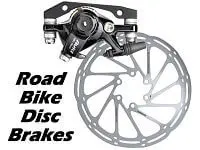
Superior Stopping with Discs?
Disc brakes are a modern addition to road bikes, making the cross over from Mountain Biking as they offer more predictable braking. This system is not reliant on your wheels being 100% true, nor does it create any wear on your rims. Due to the discs position on the wheel, discs brakes tend to attract less dirt which helps maintain braking efficiency. However, disc systems may weigh a little extra, as well as the aesthetics issue - some traditional roadies prefer the clean lines of a brake caliper; this is down to personal preference. If you wish to upgrade to discs at a later date, you will need a frame with disc mounts, as well as a new wheelset (so you can attach the disc rotors), in addition to the actual set of brakes.
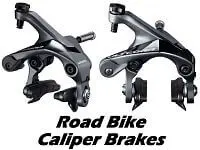
Traditional Caliper Road Brakes
A well maintained set of caliper brakes offer decent stopping performance together with less of a weight penalty than a disc system. Many cyclists prefer the cleaner look of calipers, although this varies from rider to rider. The downside of caliper brakes are that they are less predictable, as well as reliant on having straight wheels. Over time, the braking surface on your rims will wear, so in the long run you are more likely to need a new wheelset sooner, particularly on road bikes used for winter riding in poor conditions. Caliper Brakes are found on a wide range of road bikes, from the cheapest entry level bikes to professional models; it's down to rider preference.
It is vital that you choose a bike with a braking system that you are happy with, as replacing the frame, forks, wheels and brakes to revert to another braking type will be a costly endeavour.
Road Bike Drivetrain, Wheels, Components & Finishing Kit
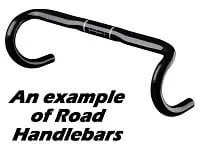
I will cover more details on aspects such as drivetrain, wheels and components at a later date, but these are inevitably defined by your budget. You won't find Di2 and carbon wheels on a low end bike. My advice would be to choose the bike with the best frame which is most suitable for your riding, as you can always upgrade components at a later date. Bear in mind that the majority of new road bikes will not come with pedals, and if you're planning on riding clipped in then you'll also need new cycling shoes, so please budget for these.
Save more money on a Road Bike
Your employer may offer a Cycle-to-work scheme which can help save you money on a new bike purchase. Also, depending on the retailer, you may be able to get cashback on a new bike purchase, so it's worth looking at Quidco, TopCashBack and the like to potentially save more money - a few percent can mount up given the cost of the bike. Members of British Cycling may get discounts at certain retailers, so in some cases it's worth paying for an annual membership just to get this discount.
To Conclude: Choosing the right Road Bike
If you take one thing from this road bike guide, it's to choose the bike which is fundamentally suited to your current and future needs. Ensure the frame and fork are the correct size & material, and provide the features that best suit your riding requirements. In particular the braking type, tyre clearance (if you plan on using larger tyres), mudguard and pannier compatibility, as well as the correct frame size.
If you're not sure whether road cycling is for you, then see if you can borrow or hire a bike first. You'll learn more about what size you need, and the style of riding you enjoy. You might establish that pedal power isn't for you (I have a range of electric bikes if this is the case!). Or that off-road is more your thing. A couple of short rides may well save you from wasting hundreds of pounds on an unsuitable bike.
Finally, it's worth searching for Reviews on Google and YouTube as whilst most modern road bikes are built to a high standard, occasionally issues arise with new manufacturing processes. The chances are many riders will have already purchased the same model as you intend to, so it's worth learning from their experiences before splashing the cash. Similarly research the retailer to find out real world experiences of their after sales support. You don't want to leave yourself stuck with a broken bike with a retailer refusing to answer your calls.
Enjoy your new bike!


